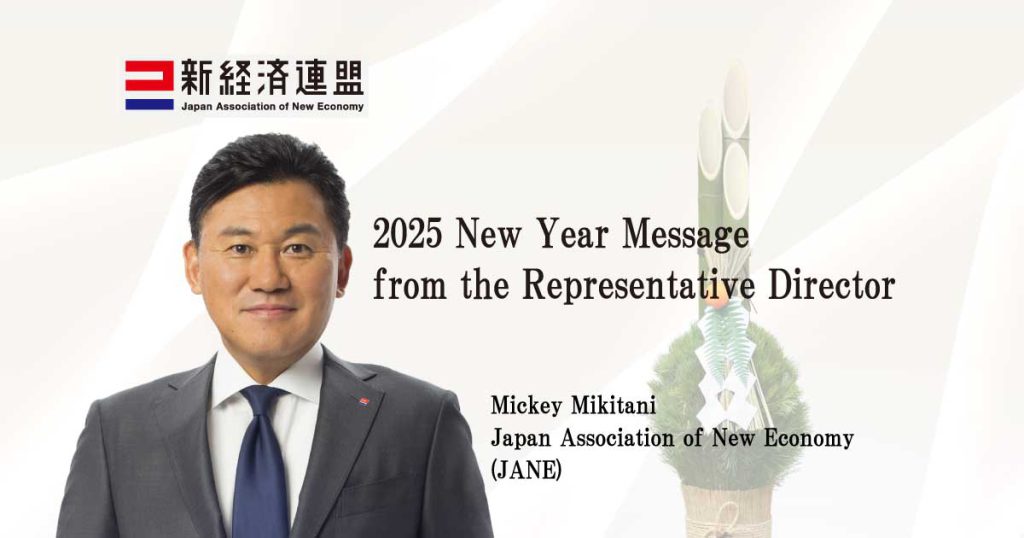- HOME
- Proposals/News
- Representative Director
- 2025 New Year Message from the Representative Director
2025 New Year Message from the Representative Director

On behalf of the Japan Association of New Economy, please allow me to extend to you our best wishes for the New Year.
In 2024, the 12th year since the start of activities, JANE experienced significant growth.
The number of member companies, which constitutes the foundation and driving force of our activities, reached 553. The “JANE & Local Cities!!” project, initiated in 2021, has facilitated the addition of new members from various regions across Japan, thereby expanding JANE’s visibility beyond the Tokyo metropolitan area.
The inclusion of numerous companies that share our vision and objectives is a significant development. JANE’s primary areas of focus include policy advocacy for the transformation and economic growth of Japan, and the promotion of interaction among members.
To ensure that the voices of our members are reflected in our policy recommendations, we have established various working groups over the past few years. In 2025, we will launch a new community focusing on Diversity Equity & Inclusion (DE&I). We will also continue to refine the content of our popular social events, such as the “Evening Meetup! By JANE” and “JX LIVE!”, which is JANE’s largest policy and social event.
In 2024, the Japanese economy demonstrated signs of transitioning out of a prolonged period of deflation and toward a state of normalization. This transition was evidenced by several key developments, including a significant increase in the Nikkei Stock Average in February, following a period of post-bubble stagnation. Additionally, the Bank of Japan took the strategic initiative of lifting negative interest rates in March.
However, it should be noted that not all developments in the Japanese economy are favorable.
“-7%”. This is Japan’s nominal GDP growth rate in US dollar terms over the 20-year period from 2003 to 2023 (*World Bank data, rounded to the nearest hundredth). Japan is the only G7 or OECD member country to experience negative growth during this period.
There are serious concerns about the future of the Japanese economy, as evidenced by Japan’s nominal GDP being surpassed by Germany in dollar terms in 2024 and its decline to 38th place in the IMD World Competitiveness Ranking.
What are the reasons for this phenomenon? The primary factor causing this change is the evolution of the economic structure. The advent of four IT revolutions—the Internet, smartphones, cloud computing, and AI—has solidified economic activity upon the basis of a “virtual economy.” However, Japan’s tax system and excessive regulations have not been able to adapt to this shift, resulting in an increasingly serious “digital deficit.”
The second factor is a labor shortage. Japan’s population is in decline, with a falling birthrate and a rapidly aging population. To address these challenges, Japan needs to increase its recruitment of IT professionals from overseas. Additionally, a significant shortage of labor exists beyond the IT sector, with rural areas experiencing particularly critical labor shortages.
The third factor is the high tax rate. Japan’s top rate of personal income tax and inheritance tax, as well as its corporate tax rate, are among the highest in OECD member countries. Addressing this issue is crucial to maintain Japan’s competitive edge in attracting highly skilled professionals. Without addressing this issue, there is a concern that promising startups that address social issues may be attracted to other countries.
JANE, the Business Association for entrepreneurs, is poised to propose policy recommendations to the Japanese government. These proposals will be grounded in business experience and aim to catalyze a fundamental transformation of the economy through the private sector’s potential.
Specifically, we propose the followings:
1. Adapting tax systems and regulations to the structure of the virtual economy
2. Actively accepting immigrants
3. Implementing “true work style reform” rather than “reform that does not make people work”
4. Reducing tax rates and attracting people, knowledge, and money from around the world
As the Japanese economy’s international presence diminishes, the importance of the three core values we have adopted for JANE—innovation, entrepreneurship, and globalization—increases annually.
In order to help the Japanese economy compete more effectively on the world stage, JANE will continue to strengthen its advocacy as a “start-up business association”.
We will do our utmost to help Japanese companies, including start-ups, realize their full potential, and we very much look forward to your continued support and cooperation in the year ahead.

